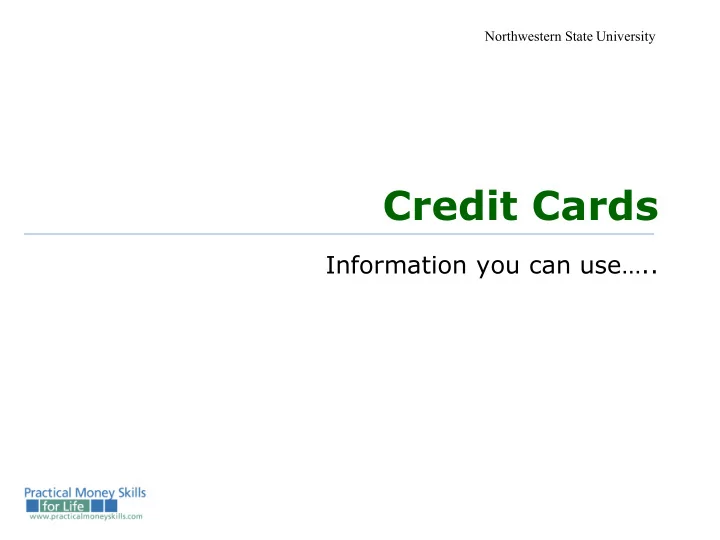

Northwestern State University Credit Cards Information you can use…..
shopping for a credit card costs: • Annual Percentage Rate (APR) • Grace period • Annual fees • Transaction fees • Balancing computation method for the finance charge features: • Credit limit • How widely the card is accepted • What services and features are available College – Lesson 5 - Slide 5 -A
calculating finance charges average daily balance: You pay interest on the average balance owed during the billing cycle. The creditor figures the balance in your account on each day of the billing cycle, then adds together these amounts and divides by the number of days in the billing cycle. adjusted balance: You pay interest on the opening balance after subtracting the payment or returns made during the month. previous balance: You pay interest on the opening balance, regardless of payments made during the month. past-due balance: No finance charge is added if the full payment is received within the grace period. If it is not received, a finance charge for the unpaid amount is added on to your next bill. College – Lesson 5 - Slide 5 -B
examples of finance charges average adjusted previous daily balance balance balance monthly 1.5% 1.5% 1.5% rates 18% 18% 18% previous balance $400 $400 $400 payments $300 $300 $300 On 15th day (new balance =$100) average daily balance N/A $250* N/A $3.75 $1.50 $6.00 finance charge (1.5% x $250) (1.5% x $100) (1.5% x $400) * To figure average daily balance: ($400 x 15 days) + ($100 x 15 days) = $250 x 30 days College – Lesson 5 - Slide 5 -C
comparing credit cards • Type of account • Annual fee • Grace period • Annual Percentage Rate (APR) • Credit limit • Minimum monthly payment • Finance charge calculation method • Late payment fee, other fees • Other features College – Lesson 5 - Slide 5 -D
risks associated with decision making if you think the reasons for the denial are valid: • Ask the creditor if you can provide additional information or arrange alternate credit terms. • Apply to another creditor whose standards may be different. • Do the things you need to do to improve your credit worthiness (pay bills on time, increase income, reduce spending, obtain a secured card, etc.) and then reapply. if you are not sure whether the reason for the denial is valid: • Ask the creditor to explain why you were denied. • Review your credit history. • If you find your credit history contains errors, take steps to correct the errors. if you believe the reason for the denial is invalid and that the creditor has discriminated against you: • Notify the federal enforcement agency whose name you were given by the creditor. The federal enforcement agency will investigate and report back to you. • If you can afford it, hire an attorney to file suit against the creditor. If the court determines the creditor did discriminate, the creditor will be required to pay you actual damages plus punitive damages. College – Lesson 5 - Slide 5 -E
reading a credit card statement College – Lesson 5 - Slide 5 -F
dealing with billing errors fair credit billing act (1974) Sets up a procedure for the quick correction of mistakes that appear on consumer credit accounts. • You can challenge a billing statement for errors such as charges for unauthorized purchases, charges for items that were never delivered, failure to credit a payment, etc. • You must notify the creditor of a disputed item within 60 days. • Creditor must investigate and, within two billing periods, either correct the mistake or explain why the charge is not in error. • You cannot be billed for or forced to pay the disputed amount until the creditor has finished the investigation. • If it is determined that you are responsible for the bill, you must be given the usual amount of time to pay it. • Your credit history is protected during the dispute process. • Creditor must supply customers with a statement of their rights at the time the account is opened and at least twice a year thereafter. College – Lesson 5 - Slide 5 -G
other credit card protections prompt credit for payment • A card issuer must credit your account on the day the issuer receives your payment, unless the payment is not made according to the creditor’s requirements. refunds of credit balances • When you return merchandise or pay more than you owe, you have the option of keeping the credit balance on your account or receiving a refund. unauthorized charges • If you report your card lost before it is used, you cannot be held responsible for any unauthorized charges. • If your card is used before you report it lost, you are liable for $0 if reported within two business days. After that, you’re liable for no more than $50.00. disputes about merchandise or services • In some circumstances, you have the right to withhold payment for unsatisfactory merchandise or services. College – Lesson 5 - Slide 5 -H
Credit card do’s and don’ts shop around • Look at various sources. read and understand the contract • Read the contract carefully. • Don’t rush into signing anything. • Once a contract is signed, get a copy of it. • Know the penalties for missed payments. know your cost • Figure out total price when paying with credit. • Make the largest payments possible. • Know the penalties for missed payments. • Buy on installment credit only after you have evaluated all other possibilities. • Don’t be misled into thinking small payments will be easy. College – Lesson 5 - Slide 5 -I
Recommend
More recommend